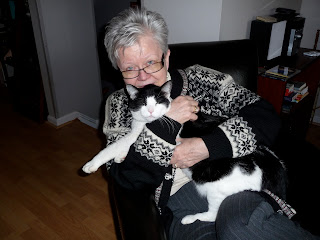 |
Lutheran Church of the Cross,
University Avenue location |
The church I worked at in Berkeley, the
Lutheran Church of the Cross, was unique in many ways. It was the result of the merger of four separate Lutheran churches in Berkeley that until the 1960s had been in four different Lutheran Synods. In 1962, with the creation of the
Lutheran Church in America, the four congregations found themselves in the same Synod and the pastors of the four churches began discussing how they could work together to build up all of their congregations without competing with one another for membership. In 1967, the merger was approved by all four congregations and the LCA synod leadership. But each congregation had a different expectation of what the new church would look like. One expectations they all shared was that their location would remain and weekly worship services would continue there.
By the time I arrived in 1970, three of the original four pastors had gone on to new ministries, leaving only one pastor for what were still four quite different congregations, one German, one Finnish, one associated with Pacific Lutheran Theological Seminary, and one associated with UC Berkeley. Each congregation continued to refer to themselves by the names of their pre-merger churches, Bethany, St. Michael's, Shepherd of the Hills, and Holy Trinity. Three of the properties remained, with the property near the University having been sold. A chapel near the University provided space on Sunday mornings so that services continued to be held each Sunday in four locations.
The office of the church was in what had been the largest of the buildings in the center of Berkeley, on University Avenue. That property was surrounded by businesses and concrete parking lots. The small patch of grass between the sidewalk and the window of my office that overlooked the street was the only patch of green for miles. As a result, I frequently found people sitting or lying on the grass when I glanced out the window. Pedestrians often stopped in front of the building, apparently enjoying the gardens that edged the building. And occasionally some of them even knocked on the door of my office.
 |
| Image by Franco Folini, via Flickr |
A middle-aged woman was a frequent visitor without an appointment. She was single, most likely past child bearing age, and she desperately wanted to have a child. She stopped in to see if she could talk with Pastor and occasionally even slipped envelopes with cash under the door when the office wasn't open, hoping that it would encourage Pastor to help her get a child.
A middle-aged man whom Pastor called Sterling Hayden because he looked so much like the actor was also a frequent visitor without an appointment. He never asked for anything. He just came by to talk.
Another man, Robert, was a frequent visitor at both the University Avenue property and the building that had previously been Holy Trinity, the Finnish congregation, on Rose Street. Robert suffered from shell-shock during World War II which resulted in his being periodically unable to stay with his family. During those times, he would sleep outdoors, sometimes on our lawn, sometimes on the lawn of the house behind the church which the church owned.
The woman who rented that property came into the church one day to complain about Robert sleeping in her back yard. She had elementary school-aged children and the night before Robert had started a fire in the lawn to cook his food. She was afraid Robert would burn down the house.
 |
| Rya rug image by planetutopia, via Flickr |
After Pastor discouraged Robert from sleeping near the University Avenue building, Robert discovered how he could get into the Rose Street building at night. He slept rolled up in a rya carpet that the ladies of the church had made. Because he knew the carpet was important to the ladies, he took it away to get it cleaned, and then couldn't remember where he had taken it. Robert also took all the knives out of the kitchen and all the scissors out of the classrooms and hid them because he said he didn't want the children to hurt themselves. Robert also understood, incorrectly, that the public address system in the Rose Street church wasn't working, so he took it to a shop to get repaired. Then he couldn't remember the name of that place either, although he did remember it was on Telegraph Avenue across the street from a hardware store. The next day I spent many hours calling all the hardware stores on Telegraph Avenue to find out if there was an electronics repair shop across the street. Apparently Robert gave a solid performance when he brought the PA system in because when I found the electronics repair shop, the owner wasn't about to let anyone else come to pick it up.
Robert's last straw was when he left the building after having turned on one of the burners in the kitchen of the Rose Street building, almost burning the building down. The next night, Pastor slept on the sofa in his office to be there when Robert broke in so he could arrange for Robert to stay somewhere in order to keep him out of trouble and our property safe. The next day Pastor asked me to call the facility he understood Robert had been committed to in order to find out if he was there. For reasons of privacy, the facility staff wouldn't tell me anything. Thankfully, Robert called the church later that day from the facility to ask Pastor to come and get him.
 |
| Image by Bazule, via Flickr |
But the most memorable character I met while working at the Lutheran Church of the Cross was Kenny. Kenny was a four-year-old version of that 8-year-old orphan I had imagined taking to basketball games and movies when I was in college. He was blond, blue-eyed, and full of energy. I met Kenny along with several other boys many years older than Kenny when they discovered the grassy area in front of my office window.
The boys were young enough that their differences didn't divide them. Two of the boys, brothers, were of East Indian descent, but their family came to Berkeley from Kenya so there was no way they would accept being called anything but Africans. One of the boys was African American and he wouldn't tolerate being called African; he was American. Those three were about eight or nine, while Kenny was four. The families of all of the boys lived in an apartment building next to the house behind the church. There was a fence between the church property and the apartment building, but the boys managed to figure out how to get through it.
The first day I saw them, I happened to have some cake in the office. So when they appeared at my window, with their faces and hands pressed up against the glass, I invited them in. I told them they were in luck but that they should not ever expect this to happen again. I had some cake that needed to be eaten. The four boys sat on the floor to eat their cake. It was obvious that the older boys weren't happy having Kenny tagging along with them, but he kept up.
From that day on, the boys would stop by to wave at me, looking as far into the office as they could see, to check whether I had more cake. Kenny was the only one to come into the office without my inviting them. I think he found his way to my office when the older boys pressed him to leave them alone. I remember Kenny asking me to come outside to play with him. I told him I couldn't because I had to work. Kenny looked up in surprise and said his parents didn't work, so he didn't know why I had to work. I said I worked to earn money to pay the rent and to buy food. That didn't seem to sink in.
 |
| Image by Elizabeth/Table4Five, via Flickr |
That first day, the older boys asked me if they could take the empty soda bottles that were in the kitchen. They were not bottles that required a deposit, so I told them they could take them. I learned later that the owner of the small store around the corner where I bought my lunch each day would take all bottles the boys brought in and he gave them a nickel for each one, even the no deposit/no return bottles. He thought it was important to make sure the bottles didn't end up broken on the street and was willing to pay the pennies the boys were so eager to get.
One day when Kenny was by himself in my office, I saw him pick up bottles from the counter and walk toward the door. I stopped him and told him I didn't like it when he stole my bottles. Again, he looked at me without understanding in his eyes. He said he wasn't stealing them. I responded, not realizing how significant my word choice would be, that he was ripping me off. Now
that Kenny understood. He put down the bottles and put his hands on his hips and declared, "I am
not ripping you off. I would
never rip someone off." Later I learned what a clue that response was to Kenny's home life.
All the boys were well dressed, but Kenny's clothes were always spotless and obviously new. I assumed that Kenny's parents were concerned about him, as I expected all parents were. But I learned that one of the reasons Kenny hung around with the older boys was that his parents would lock him out of the house for hours at a time, something that didn't quite fit with the image of concerned parents.
One time when Kenny came to my office alone, he sat down at the second desk in the office. He picked up a stapler and asked me for some paper. I gave him some sheets that I would have thrown away and Kenny started stapling the papers together. I asked him what he was doing and he said he was working because someone in his family had to earn money for rent.
 |
| Image by freefotouk, via Flickr |
My friends Doug and Nancy lived in an apartment above the garage at the end of the church parking lot. Their back windows looked out over the parking lot next to the apartment building. One evening, Doug called to tell me that the police had been in the parking lot that night and they had taken Kenny and his parents away, the parents in handcuffs. Doug had talked with a few of the neighbors and learned that Kenny's parents were arrested for dealing drugs.
The next morning, Kenny showed up in my office full of energy. In spite of his small size he nearly threw the door open and rushed in with a big grin and said, "Guess where
I was last night!" Without waiting long enough for me to answer, he continued "I was in the
pig station." This time he didn't stay around. He rushed back out, probably to share his news with others. I learned later that Kenny was taken away from his parents and put into his grandparents' custody. I never saw him again.

















+by+glenmcbethlaw.jpg)
+by+lisibo.jpg)










